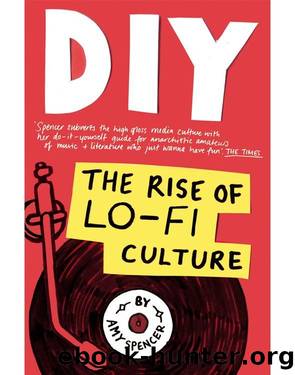DIY: The Rise of Lo-Fi Culture by Amy Spencer

Author:Amy Spencer
Language: eng
Format: epub
ISBN: 9780714522609
Publisher: Marion Boyars Publishers
The Impact of the Punk Zine
The punk zine did not need to appeal to a wide market. As their publications could be sold at gigs and in record shops, unlike the editors of underground newspaper editors, punk zine founders were rarely concerned with widescale distribution. In fact, they were only really interested in reaching fellow punks. This meant that they did not need to tone down their attitudes to court the mainstream, and such disregard is evident in the dominant style, which was rough and angry looking. The sloppy style seemed to be a badge of authenticity. If a zine wasnât slick in appearance or perfect in terms in presentation, and was not interested in reaching a mass audience, then the content was seen as truthful and therefore something to believe in. The rough style intentionally emphasized the unprofessional nature of the zine and asserted its independence from the mainstream. The punks did not aim to please anyone else or sell their zines to anyone who wasnât already a part of their world.
Music was generally the primary focus of the punk zine. It was this angry new sound that brought young punks-in-the-making together and it was this that was most celebrated. Zine pages were filled with reviews of gigs and records as well as interviews with bands. But this was different from the representation of music in mainstream magazines. This was media written by people who were positioned inside the music scene rather than impartial critical observers on the outside. New bands were written about almost as soon as they were formed, long before the mainstream music magazines such as the NME knew about them. This was a music scene documenting itself, caused in part by the lack of early coverage of punk in the mainstream music magazines, who failed to recognize its worth as a valid music scene. That they were so slow on the uptake meant punks were at first forced to write about themselves, and their antipathy towards the music industry meant that they were happy to do so. This set the punk scene apart from other previous music scenes. It was founded on DIY principles and these became its strength. The zine was a medium over which the creator had ultimate control. The punk ethos could be transmitted without any interference from the mainstream press, or the music press.
As Jon Savage explains, âAlthough the British music magazine, the NME, is always presented as the champion of punk, that was not actually so. Because of the NMEâs collective ego, it hung back before it could give its âimprimaturâ to the movement.â Other British music magazines, Sounds (John Ingham, Giovanni Dadamo) and Melody Maker (Caroline Coon) were much more off the mark in 1976. (I never saw Tony Parsons or Julie Burchill as being as representative or as influential as they, and many others, would now have it.)â
When the British music press caught up with the new punk music that the zines were writing about, it revitalized them.
Download
This site does not store any files on its server. We only index and link to content provided by other sites. Please contact the content providers to delete copyright contents if any and email us, we'll remove relevant links or contents immediately.
The Goal (Off-Campus #4) by Elle Kennedy(12416)
Kathy Andrews Collection by Kathy Andrews(10501)
Diary of a Player by Brad Paisley(6858)
What Does This Button Do? by Bruce Dickinson(5518)
Assassin’s Fate by Robin Hobb(5226)
Big Little Lies by Liane Moriarty(4872)
Pale Blue Dot by Carl Sagan(3993)
Sticky Fingers by Joe Hagan(3447)
The Heroin Diaries by Nikki Sixx(2927)
The Death of the Heart by Elizabeth Bowen(2894)
Beneath These Shadows by Meghan March(2708)
The Help by Kathryn Stockett(2700)
Confessions of a Video Vixen by Karrine Steffans(2666)
How Music Works by David Byrne(2517)
Jam by Jam (epub)(2479)
Harry Potter 4 - Harry Potter and The Goblet of Fire by J.K.Rowling(2411)
Strange Fascination: David Bowie: The Definitive Story by David Buckley(2363)
Petty: The Biography by Warren Zanes(2234)
Darker Than the Deepest Sea by Trevor Dann(2204)
